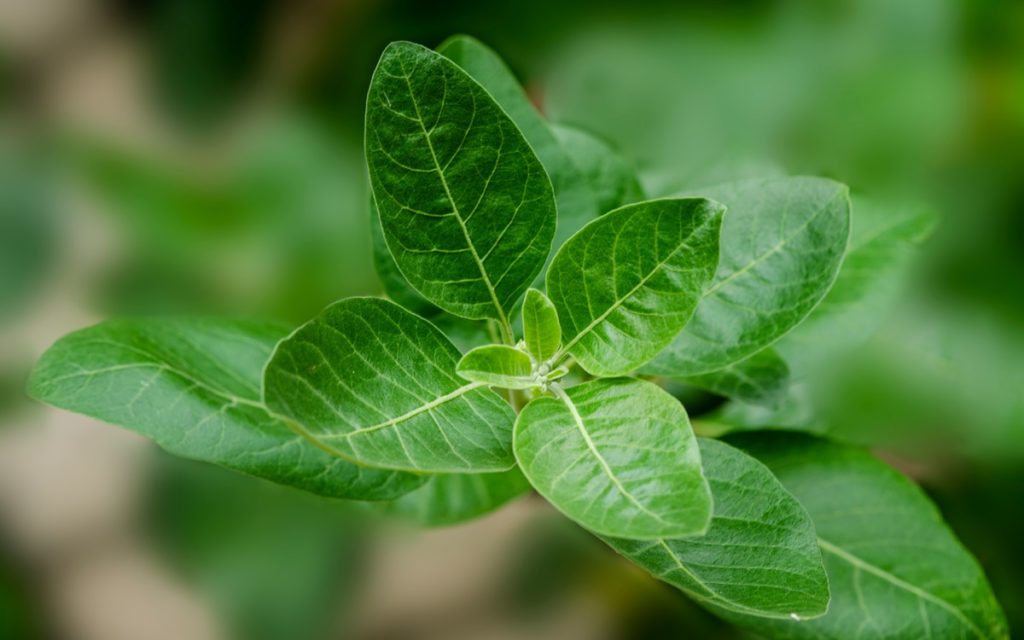Ayurveda has a miracle cure for sleep disorders and inner restlessness: ashwagandha. The herb has a stress-reducing effect and helps to give you more strength and energy. It therefore has a long tradition in Ayurvedic medicine and is used to treat all kinds of ailments. You can find out exactly what ashwagandha is, how it works and how to take it here.
What is ashwagandha?
Ashwagandha (botanically Withania somnifera) is an Ayurvedic Ayurvedic medicinal plantwhich grows mainly in India, Pakistan and Afghanistan as a small shrub with red berries. The name comes from Sanskrit and means "smell of the horse".


The origin of the name is not known for certain, but it probably comes from the fact that the smell of the plant is actually reminiscent of that of horses. Or perhaps it simply comes from the fact that the plant is supposed to awaken strength - after all, the horse is symbolic of strength and vitality.
Because it has such a positive effect on sleep patterns, the plant is known in this country as the sleeping berry. However, it is also occasionally referred to as winter cherry or Indian ginseng.
The plant has been known in Ayurvedic medicine for over three millennia and is used to heal a wide range of ailments. The plant is also said to have a life-prolonging effect, supporting your life energy Ojas and your longevity.
Ashwagandha ingredients
Ashwagandha's benefits and effects are not least due to its ingredients. The active ingredients are contained in the leaves, but in even higher concentrations in the root of ashwagandha. The most important ingredients of the plant (3) are
- Alkaolide
- Withanolides
- Choline
- Fatty acids
- Amino acids
What is ashwagandha used for? - Effect on the mind and body
The plant is often regarded as a "miracle berry" in Ayurveda because it can be used in so many different ways. First and foremost, the herb is used to balancestress and the associated typical Vata disorders.
If the vata dosha is elevated due to physical and mental stress, we feel this in the form of worries, anxiety and sleep disorders. But digestive problems, muscle complaints, twitching or emotional upsets can also make themselves felt.
But what are the benefits of ashwagandha? If you feel an increased Vata dosha, feel restless or sleep badly, then watch out! We'll show you what this plant can do!
Attention:
You should only take dietary supplements after consulting your doctor. The information provided in this article is for educational purposes only and is not a substitute for medical advice! The recommended dietary supplements should be taken at your own discretion.
Better sleep and more strength
Ashwagandha has many benefits and brings inner peace as well as energy for body and mind. This may sound like a contradiction in terms, but they are actually linked. Because as soon as your restless mind relaxes a little, the quality of your sleep also improves.
You drift off to sleep more easily and the deep sleep phases are extended. The result: the next morning you get up more rested and with more energy.


After all, it is not without reason that the plant is also known as the sleeping berry and is usually administered in Ayurvedic medicine for sleep disorders. However, if you are well-rested, it has many other positive effects.
This is because it also increases performance, memory and concentration. The herb therefore sharpens your mind and you can work with greater concentration.
The emotions are balanced
Ashwagandha can also heal general restlessness, anxiety and nervousness. It calms the nerves and your agitated feelings slowly regain their balance.
Tensions begin to dissolve and you find your center again. With regular use, the body learns to deal better with stress (6) and you become more relaxed and peaceful inside.
The digestion is soothed
Tension and stress all too often affect the stomach. If the vata dosha is elevated, this imbalance can be felt through flatulence, constipation or nausea.
However, the medicinal herb can help you to calm the vata dosha and alleviate digestive complaints. So you and your digestive tract as well as the digestive fire Agni will be well.


Ashwagandha and potency
The plant also has a tradition in Ayurveda as an aphrodisiac and is even said to increase potency. While ashwagandha is said to increase potency in men, it can also have a positive effect on women.
For example, it can help to increase libido and lead to more sexual fulfillment. So it can't hurt to give ashwagandha a try if you want to have children, right?
Is it possible to lose weight with ashwagandha?
Stress has a major influence on obesity. Our body releases more cortisol, especially when we are under constant tension, which can cause an increased appetite and even downright ravenous appetite attacks. How can ashwagandha help against this?
Now that it has a stress-reducing effect, the herb prevents the body from producing too much cortisol. The appetite is therefore somewhat curbed and remains within the normal range. The plant also stabilizes our blood sugar levels, which is why it can also be used to treat diabetes (4).
If blood sugar levels drop too quickly, the body also reacts with an increased feeling of hunger. However, when ashwagandha is taken, such hypoglycaemia does not occur in the first place. In this way, the medicinal herb can actually be a good dietary supplement for losing weight!


Discover high-quality nutritional supplements in our store now
To support a balanced diet, we recommend selected Ayurvedic food supplements and supplements.
On the other hand, ashwagandha can also be used to support muscle building . It accelerates the development of muscles, which also has an effect on weight. Ashwagandha can therefore cause weight gain through more muscle tissue.
Are there any side effects when taking Ashwagandha?
With a normal dosage of ashwagandha , side effects are generally not to be expected. However, if you overdo it with the dose, you may experience abdominal pain, nausea or diarrhea. However, if you stick to the recommended dose, there is no cause for concern!
However, pregnant and breastfeeding women and children are still advised not to take the herb. The reason for this is that there have not yet been any studies on this and it is therefore better to play it safe for the time being (1, 2).
If you are taking medication, you should also consult a doctor beforehand to ensure that the combination with ashwagandha does not lead to any disadvantages or interactions. Otherwise, however, it is completely safe.
Can ashwagandha cause liver damage?
Some studies indicate a possible influence of ashwagandha on the function of the thyroid gland and on altered liver values. Therefore, if you have a pre-existing liver or thyroid condition, you should always consult a doctor before taking the herb.
Is ashwagandha dangerous? No, there are no proven health risks for healthy people (4). However, the German Federal Ministry for Risk Assessment (BfR) advises people with pre-existing liver or thyroid conditions in particular not to take it (1).
Ashwagandha: the correct dosage and intake
In this country, the medicinal herb is not listed as a medicine, but is considered a dietary supplement. It is therefore freely available on the market and can simply be bought in the form of capsules or powder.
The recommended dose is 300-500 mg per day, ideally taken with meals. However, the effect of ashwagandha depends on how it is taken. Make sure you choose high-quality preparations!
Capsules
The advantage of ashwagandha capsules is that the dosage is already fixed. They are therefore ideal as a starter product because you can't go wrong with them.
The capsules can simply be taken with a little liquid and are completely tasteless. However, the effect usually only occurs after some time. You can therefore take the capsules to start with.
Powder
Ashwagandha powder is made from the ground roots of the plant and can be used in various ways. A tea is particularly popular and easy to prepare, but the powder can also be added to yogurts or smoothies.
In this way, you benefit from the substance in its pure form and can dose it individually, just as it is good for you!
Ashwagandha recipes: benefit from the effect
To be honest, it has to be said: The taste of ashwagandha powder may take some getting used to, as it tastes a little bitter. But don't worry, it's all a question of preparation!
If you would like to experience the effects of the medicinal plant for yourself, we have two delicious recipes for you here. This way, taking it becomes a daily ritual and tastes delicious to boot.
Ashwagandha tea
It has long been known in various cultures: A nice cup of tea helps you fall asleep. If you add some ashwagandha to it, you get a particularly effective nightcap!


You need:
- 1 teaspoon ashwagandha powder
- hot water
- Cinnamon or cardamom
- 1 teaspoon honey or agave syrup
Boil the water and add the powder. Then leave the tea to infuse for around 5 minutes. To counteract the bitter taste, we recommend adding a little cinnamon, cardamom or a spoonful of honey or agave syrup.
Ashwagandha tea has a calming and soporific effect and is even said to have an antibacterial effect. This allows you to drift off to a gentle sleep in the evening.


Discover our European Ayurveda® teas now
Ayurvedic tea is an integral part of Indian medicine. You can use it to cleanse, heal and stimulate your body - or simply relax with a cup of tea. Here you will find selected Ayurvedic teas of different varieties in the best quality.
Moon Milk
Everyone knows that a warm milk before going to bed gives you a pleasantly relaxed feeling and helps you to calm down. The so-called Moon Milk also contains ashwagandha and therefore promotes healthy and deep sleep all the more.
You need:
- 200 ml (almond, oat or other plant-based) milk
- 1 teaspoon ashwagandha powder
- 1 teaspoon honey or agave syrup
- 1 tsp raw cocoa powder
- 1 teaspoon dried lavender flowers
Heat the milk slowly and gradually stir in all the ingredients. Instead of cocoa powder, you can also simply use a pinch of cinnamon, depending on your taste. If you like, you can of course vary the ingredients - it's entirely up to you. The important thing is that it tastes good and helps you to relax.
Ashwagandha can provide more balance and equilibrium in your life thanks to its positive effects. But don't forget that Ayurveda is always a holistic approach and taking the plant alone cannot compensate for an unhealthy lifestyle.
However, in combination with meditation and the right Ayurvedic diet, ashwagandha can make your everyday life less stressful and help you to find your center again.


How can I regulate my nervous system? 4 tips from European Ayurveda®
An overstimulated nervous system is one of the most common causes of chronic complaints. Irritable bowel syndrome, exhaustion, hormonal imbalances, insomnia and migraines are common consequences. We show you how you can regulate your nervous system with European Ayurveda and get back into Vata balance.
Cover picture: © eskymaks - istockphoto.com (file no.: 1041090420)
Ashwagandha studies and sources:
(1) Federal Institute for Risk Assessment (2024): Ashwagandha: sleeping berry preparations with potential health risks.
(2) Federal Institute for Risk Assessment (2012): Risk assessment of plants and herbal preparations.
(3) Mirjalili M. et al. (2009): Steroidal lactones from Withania somnifera, an ancient plant for novel medicine. Molecules (14/7), pp. 2373-2393.
(4) Gorelick, J. et al. (2015): Hypoglycemic activity of withanolides and elicited Withania somnifera. Phytochemistry (116), pp. 283-289.
(5) Raut, A. et al. (2012): Exploratory study to evaluate tolerability, safety, and activity of Ashwagandha (Withania somnifera) in healthy volunteers. Journal of Ayurveda and integrative medicine (3/3), pp. 111-114.
(6) Chandrasekhar K. et al. (2012): A prospective, randomized double-blind, placebo-controlled study of safety and efficacy of a high-concentration full-spectrum extract of ashwagandha root in reducing stress and anxiety in adults. Indian Journal of Psychological Medicine (34/3), pp. 255-262.






